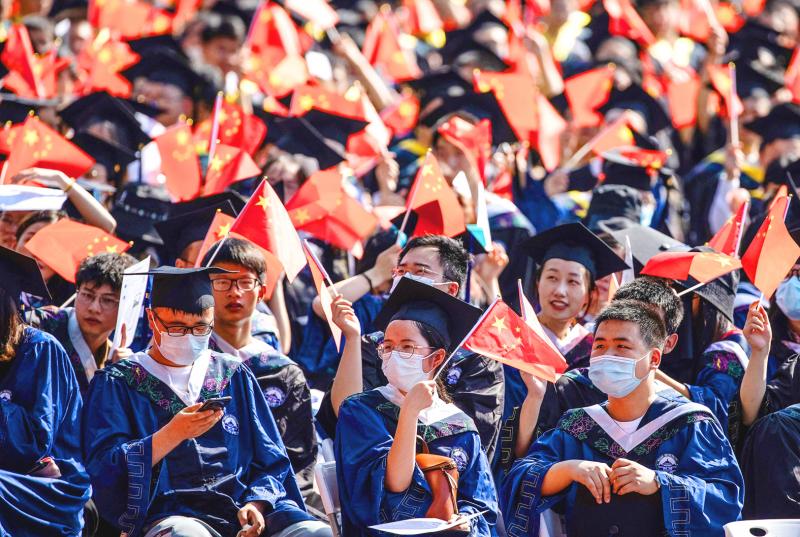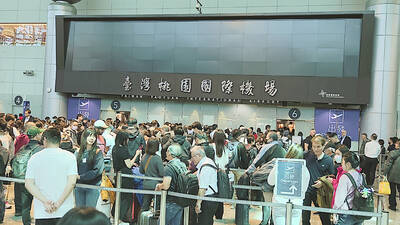China is facing a labor crisis as graduates are rejecting any kind of blue-collar work, even highly paid technical jobs, the Mainland Affairs Council said in a report that said stagnant social mobility and conspicuous wealth contributed to swelling the ranks of dispossessed young people in the country.
The council last month published an analysis of China’s work environment in a report written by National Chengchi University assistant professor of sociology Chiang Yi-lin (姜以琳).
Greater access to higher education in China has made it difficult to fill blue-collar job vacancies, exacerbating a poor labor outlook already challenged by the COVID-19 pandemic, international affairs and cooling economic growth, the report found.

Photo: AFP
Nearly 10.76 million graduates are expected to enter the job market this autumn, setting a record that is expected to continue to rise in the years to come, it said.
Despite these record numbers, unemployment among graduates has not improved over the past decade, while the supply of professional jobs has not grown to meet demand, it said.
“Some people do not have jobs and some jobs do not have people,” the report cited academics as saying, with college graduates shunning certain jobs.
In response, researchers are calling for young people to be re-educated to instill the view that “there is no such thing as a good or bad job,” it said.
The Chinese Ministry of Education intends to solve the issue through improved vocational education, but factory work — even highly paid technical jobs — are still considered blue-collar and therefore unattractive to college graduates, the report said.
Graduates prefer white-collar jobs, not only because they are considered higher class, but also because of their shorter hours, less demanding work and potential for advancement, it said.
In contrast, factory work is often more physically demanding and requires longer hours in worse working environments, making it less attractive, despite offering higher salaries, it said.
Many young people have responded by “lying flat” (tangping, 躺平), a popular online buzzword for living simply with few desires that has raised alarm among authorities, the report said.
Although it originated in China, the “lying flat” culture has also appeared in places where social inequality is prevalent and property is difficult to buy, such as Taiwan and the US, it said.
In Taiwan, as elsewhere in East Asia, many young people are required to work overtime without sufficient compensation, the report said.
Young people worldwide are facing the same problem and responding the same way, whether they are Chinese “lying flat,” Taiwanese finding “small fortunes” or Americans refusing to buy real estate, it added.

The National Immigration Agency (NIA) said yesterday that it will revoke the dependent-based residence permit of a Chinese social media influencer who reportedly “openly advocated for [China’s] unification through military force” with Taiwan. The Chinese national, identified by her surname Liu (劉), will have her residence permit revoked in accordance with Article 14 of the “Measures for the permission of family- based residence, long-term residence and settlement of people from the Mainland Area in the Taiwan Area,” the NIA said in a news release. The agency explained it received reports that Liu made “unifying Taiwan through military force” statements on her online

A magnitude 5.7 earthquake struck off Taitung County at 1:09pm today, the Central Weather Administration (CWA) said. The hypocenter was 53km northeast of Taitung County Hall at a depth of 12.5km, CWA data showed. The intensity of the quake, which gauges the actual effect of a seismic event, measured 4 in Taitung County and Hualien County on Taiwan's seven-tier intensity scale, the data showed. The quake had an intensity of 3 in Nantou County, Chiayi County, Yunlin County, Kaohsiung and Tainan, the data showed. There were no immediate reports of damage following the quake.

Actor Darren Wang (王大陸) is to begin his one-year alternative military service tomorrow amid ongoing legal issues, the Ministry of the Interior said yesterday. Wang, who last month was released on bail of NT$150,000 (US$4,561) as he faces charges of allegedly attempting to evade military service and forging documents, has been ordered to report to Taipei Railway Station at 9am tomorrow, the Alternative Military Service Training and Management Center said. The 33-year-old would join about 1,300 other conscripts in the 263rd cohort of general alternative service for training at the Chenggong Ling camp in Taichung, a center official told reporters. Wang would first

MINOR DISRUPTION: The outage affected check-in and security screening, while passport control was done manually and runway operations continued unaffected The main departure hall and other parts of Terminal 2 at Taiwan Taoyuan International Airport lost power on Tuesday, causing confusion among passengers before electricity was fully restored more than an hour later. The outage, the cause of which is still being investigated, began at about midday and affected parts of Terminal 2, including the check-in gates, the security screening area and some duty-free shops. Parts of the terminal immediately activated backup power sources, while others remained dark until power was restored in some of the affected areas starting at 12:23pm. Power was fully restored at 1:13pm. Taoyuan International Airport Corp said in a